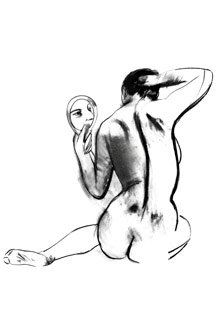Stop Being So Hard on Yourself

Illustration: Vivienne Flesher
Everywhere we turn, there are images of gorgeous women, constant reproaches to the reality of us, with our real bodies and un-Photoshopped flaws. We're not buying it anymore. We're tackling the critics—from the parents and teachers who favor the prettiest children to look-ist employers to the most hurtful of all, that nasty, catty girl who lives right behind our eyes.
Not long ago, I sat in my office, chatting with a friend. "I want to talk to you about your face," I said. "Oh my God," she said, looking stricken. "Do I need a facelift?" (I forget that people think I have a right to be openly critical of their appearance because I'm a beauty editor.) No, no, I said; I only wanted to know what she saw when she looked in the mirror."I like my face now," said this woman, a classically beautiful 38-year-old, very polished and buttoned-up, as neat and perfectly composed as a Modigliani painting. "But I was adopted from Korea when I was 3, and I grew up in a predominantly white community in a small Midwestern city, where there weren't many other people who looked like me. I was teased, called names; I basically spent my entire childhood being made fun of because of my face." She said this calmly and, recollecting, was silent for a moment. I waited for her to go on. But when she tried to speak again, she burst into tears. And there she sat in the chair across from my desk, crying hard for several minutes. I offered her a handful of tissues while she apologized for breaking down. This woman is so self-controlled, I've never even seen her yawn. Finally, she said, "I didn't realize how fragile I still am about this.
"I wanted to do anything I could not to look Asian, because it set me apart," said my friend. "You know, I had some really bad perms. But when I got to college, where there were a mix of ethnicities, the stigma of my face just disappeared. There were people who appreciated my beauty, and so I began to see myself the way they did." In other words, she made the liberating discovery that there was nothing wrong with her face, and something wrong with the culture of her hometown.
Though race hadn't been an issue for me, I, too, was teased and called names because of my appearance (suffice it to say I spent several difficult years as a grasshopper before slowly metamorphosing into a normal-looking teenager). And I, too, did everything I could to try to fit in with my peers, including dying my dark hair blonde and tweezing my brows into a shape that might generously be called unnatural. In a way, we're all trying to "pass," minimizing with cosmetics (or, in the extreme, surgery) what deviates from the cultural ideal, playing up what conforms, says Rita Freedman, PhD, a clinical psychologist and author of the 1986 book Beauty Bound. "It's what you project onto the reflection in the mirror that determines how you evaluate it," she says.
I spoke to several other women I had assumed—because they are all accomplished and beautiful—felt fine about their face. One, thinking of a photograph of herself as a 13-year-old, teared up as she remembered the depth of her self-revulsion. (This time I was ready with the tissues.) Another tried determinedly to convince me that she was a truly ugly person till her 20s, at which point, she said, she was briefly attractive before becoming merely plain in her 30s. A third told me she couldn't wait to get glasses so that she could hide the gigantic bump on her nose (a gigantic bump that was invisible to me). And a fourth—stunning, without a stitch of makeup—said that she knew she wasn't horribly disfigured, but avoided looking at her face in the mirror whenever possible (as if she were...horribly disfigured).



